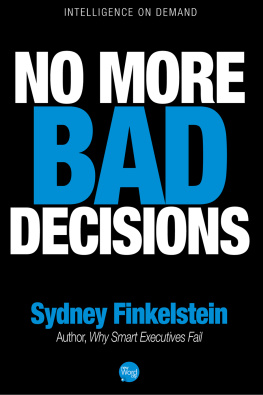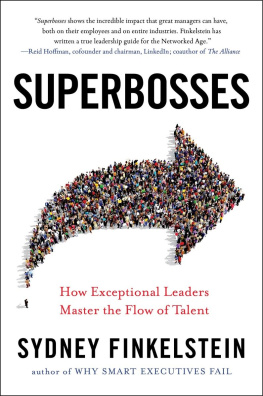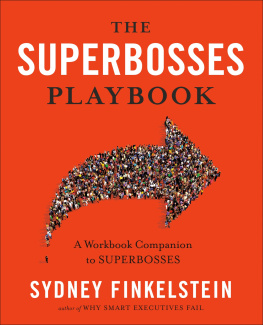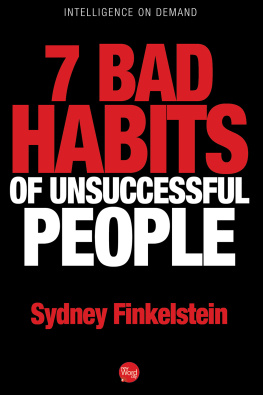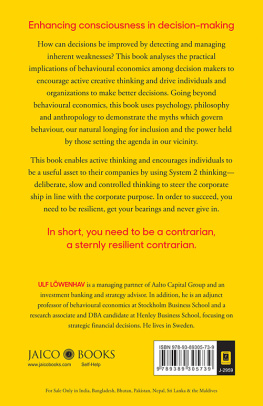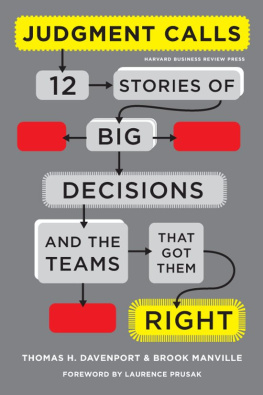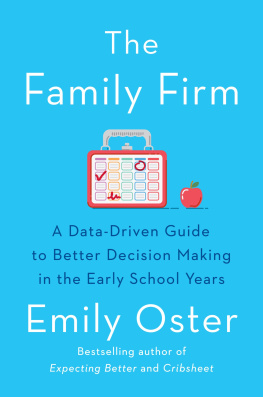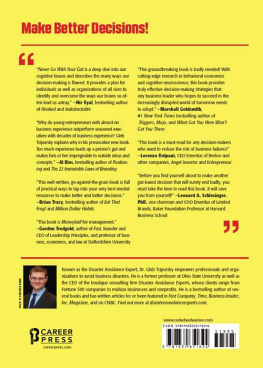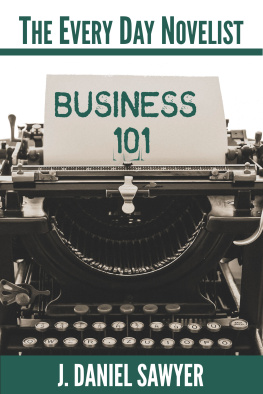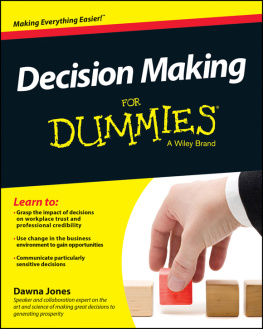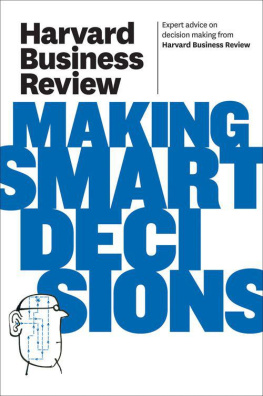Sydney Finkelstein - No More Bad Decisions
Here you can read online Sydney Finkelstein - No More Bad Decisions full text of the book (entire story) in english for free. Download pdf and epub, get meaning, cover and reviews about this ebook. year: 2014, publisher: New Word City, LLC, genre: Romance novel. Description of the work, (preface) as well as reviews are available. Best literature library LitArk.com created for fans of good reading and offers a wide selection of genres:
Romance novel
Science fiction
Adventure
Detective
Science
History
Home and family
Prose
Art
Politics
Computer
Non-fiction
Religion
Business
Children
Humor
Choose a favorite category and find really read worthwhile books. Enjoy immersion in the world of imagination, feel the emotions of the characters or learn something new for yourself, make an fascinating discovery.
- Book:No More Bad Decisions
- Author:
- Publisher:New Word City, LLC
- Genre:
- Year:2014
- Rating:5 / 5
- Favourites:Add to favourites
- Your mark:
- 100
- 1
- 2
- 3
- 4
- 5
No More Bad Decisions: summary, description and annotation
We offer to read an annotation, description, summary or preface (depends on what the author of the book "No More Bad Decisions" wrote himself). If you haven't found the necessary information about the book — write in the comments, we will try to find it.
Business success stories may be instructive, but we need to know more about why smart people make bad decisions. In this short-form book, Sydney Finkelstein, a professor at Dartmouths Tuck School of Business who has studied these crucial questions for almost twenty years, tells how decisions really get made and describes the four signals that can alert you when emotions are interfering with your thinking.
No More Bad Decisions — read online for free the complete book (whole text) full work
Below is the text of the book, divided by pages. System saving the place of the last page read, allows you to conveniently read the book "No More Bad Decisions" online for free, without having to search again every time where you left off. Put a bookmark, and you can go to the page where you finished reading at any time.
Font size:
Interval:
Bookmark:
Business bookshelves teem with success stories. Companies in search of excellence always go from good to great. Jack Welch tells how he made General Electric a winner. We learn the seven secrets of intelligent people and the art of investing. Writers pay lip service to learning from mistakes, but, in practice, no one says much about failure.
Yet bad decisions pose some of the most interesting questions in business. For example, why did so many smart people invest with Bernie Madoff?
In almost twenty years of studying bad decisions and business failures, I have found that the reasons have nothing to do with a lack of intelligence, unforeseeable events, moral failings, or any of the other tropes we rely on to explain disasters. Leaders who make big mistakes are almost always supremely smart and boast stellar track records. How do they go wrong?
Business schools teach students to make decisions by gathering all the relevant data, assessing it, identifying alternatives, weighing the pros and cons of each option, and choosing the best one. Some leaders may even do all that, but if they do, I believe, they are usually just elaborately legitimizing a choice they were going to make anyway. The truth is that we make decisions because of the way our brains are wired and how they process information.
Here, I explain how and why smart people make dumb choices. I identify the four red flags that signal trouble in the making and suggest practical ways to avoid bad decisions.
Sometimes it makes perfect sense to skip the analysis and make snap decisions. That clearly paid off for our remote ancestors, and thats the way we have evolved: If theres a large striped animal charging toward you in the tall grass, and you think about this problem for a little too long, you dont get to pass along your genes.
And in practice, if you analyze all the possible pros and cons of every decision, you wont be able to get out of bed in the morning. Which side will you rise from? Theres a soft rug on the left, but the restroom is closer if you get out on the right. Which leg goes first? Which pair of trousers will you put on, starting with which foot? Shortcuts are a necessary part of life.
My first major finding was that most decisions actually get made by a process I call one plan at a time. You start with a solution; then, if theres time, you work backward to analyze the pluses and minuses of each possible alternative. If your first choice wont work, you pick another and work back from that.
Sometimes this quick, intuitive process works perfectly, as it did for Captain Chesley Sullenberger, the US Airways pilot who made a successful emergency landing in the Hudson River. His Airbus A320 took off from New Yorks LaGuardia Airport, hit a flock of birds, and both engines almost instantly shut down. He had to make a very quick decision.
There was no time to run through a complex set of alternatives and debate the merits of each. He couldnt call the head office or poll the passengers to find out what they thought he should do. He just decided that he was going to turn around and get back to LaGuardia. It was a perfect example of one plan at a time.
But the plan changed quickly: As he turned south over the George Washington Bridge, he realized he didnt have the altitude to make it back to LaGuardia. So he came up with a second one plan at a time, to land in Teterboro, New Jersey. But that only lasted for a few seconds, because then he realized he wasnt going to make it to Teterboro, either. When flight control asked him which runway he would prefer at Teterboro, he said he was going to be in the Hudson. Flight control said, Im sorry. Say again. But that third instant plan worked out well, partly because of luck but also because Sullenberger was the right man in the right place at the right time. He was a veteran pilot. He was an experienced accident investigator, and, to top it all off, he was a certified glider pilot. He flew without power to a perfect touchdown in the river, and all 155 passengers and crew survived.
Many people in many walks of life live their lives one plan at a time. And often this works perfectly well. But it can also go horribly wrong, as when four policemen in Harlem shot an unarmed teenager because they mistakenly perceived in a millisecond that the wallet in his hand was a gun. Even when there is time to think, problems may occur because people believe that their intuitive decision is simply the right thing to do, and they arent willing to consider any alternatives or new information. In the complex world we live in, too many shortcuts can be dangerous.
That leads to the second major finding of my research, the most obvious observation that can be made about decisions: Emotions play a significant role in making them. Of course, we all know that, but we tend to pretend to be entirely rational. If you talk to senior executives about key decisions they have made, I guarantee you that you will never hear the word emotion. Its another example of the human capacity to believe two contradictory things at once. In the long run, however, the emotion you are ignoring may make your decision a disaster.
Perhaps the quintessential bad emotion-influenced decision was made by An Wang, the founder of Wang Laboratories, which invented the first word processor. Wang embodied the rags-to-riches story of a Chinese immigrant, talented and smart, whose company in its heyday was a leader of the electronics industry. But the dominant player in the industry was IBM, which was gearing up to produce the first personal computer.
Today, we think of the PC as disruptive technology, an innovation that could revolutionize the market and would clearly be a risk to Wang Labs. But Fred Wang, An Wangs son and the company president at the time, told me that when he asked his father what they should do about IBMs plans, An Wang told him, The PC is the stupidest idea Ive ever heard in my life. Did that mean that An Wang was not smart, didnt know his business, or didnt understand technology? Clearly not, given everything he had accomplished. His misjudgment wasnt at all about capability, intelligence, or business acumen.
Fred Wang told me that early in his fathers career, he invented a promising computer component for electronic calculating machines. IBM sued him for patent infringement, and since he had no chance of winning against IBMs vast resources, he settled the case and gave up his invention to IBM for a small price. He developed a visceral hatred for IBM, which led him to emotional reactions: If IBM was betting on the PC, he would have no part of it. He felt that Wang Labs was superior to IBM, that he had beaten IBM before and would do it again. It became an obsession. And when Wang Labs finally did produce a PC, rather than adopt the IBM operating system that had become the industry standard, Wang chose his own proprietary system, which was the beginning of the end of the company.
How can you tell whether the decision youre about to make is properly quick and intuitive or whether it might be colored by emotion and calls for more analysis? Over the years, my colleagues and I have pored over psychological and neurological studies, our own case histories, and third-party business literature. And we have found that while there are many emotional traps that may catch leaders, most of them fall into four categories. So there are four red flags to watch out for.
The first warning sign is counterintuitive: Beware of being misled by your own experience.
In real life, its the rare circumstance, as in Captain Sullenbergers, when a persons experience is perfectly matched to the decisions that must be made. In most cases, what we see as a parallel from our past turns out to be different enough from the present problem that experience leads us to the wrong conclusion. In fact, it isnt hyperbolic to say that any time youre tempted to think your experience gives you an edge, that idea is a red flag. Beware.
Next pageFont size:
Interval:
Bookmark:
Similar books «No More Bad Decisions»
Look at similar books to No More Bad Decisions. We have selected literature similar in name and meaning in the hope of providing readers with more options to find new, interesting, not yet read works.
Discussion, reviews of the book No More Bad Decisions and just readers' own opinions. Leave your comments, write what you think about the work, its meaning or the main characters. Specify what exactly you liked and what you didn't like, and why you think so.

